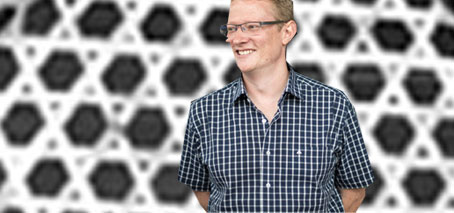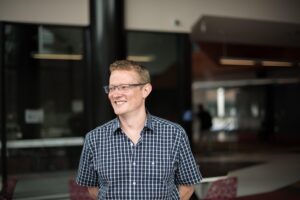Kagome metals: From Japanese basket to next generation electronic devices
FLEET AI Dr Mark Edmonds received an ARC Future Fellowship in this week’s announcement by the Minister.
The new ARC Fellowship will support Mark’s work investigating a new type of 2D material that is very promising for faster, more energy-efficient future electronic devices.
‘Kagome’ metals have a topological non-trivial nature and thus can pass electrical current without resistance, making them ideal for next-generation, beyond-CMOS electronic devices.
Within the 2D metal, transition metals such as iron and manganese are arranged in a kagome geometry – that is, following a ‘star-like’ pattern (named after a type of woven basket in Japan).
The four-year Future Fellowship project aims to grow kagome metals in the ultra-thin layers needed to realise this potential, make devices and study their electronic properties.
With this new funding, Mark and his team aim to demonstrate that kagome metals can form the basis of ultra-low energy electronic devices, as well as having future applications in high-temperature, fault-tolerant quantum computing.
Dr Mark Edmonds is an experimental condensed matter physicist working on realising large-bandgap topological insulators in two dimensions in the School of Physics and Astronomy at Monash University. He has been a Scientific Associate Investigator within FLEET since the start of the Centre.
Future Fellowships support excellent mid-career researchers in areas of national and international benefit.
Minister for Education Jason Clare announced the 2022 100 Future Fellows who will share $95 million to conduct four-year research projects addressing key industry challenges.
Mark’s contributions to the Faculty of Science have recently been recognised by his promotion to Senior Lecturer.
- Contact Dr Mark Edmonds (Monash University) mark.edmonds@monash.edu


